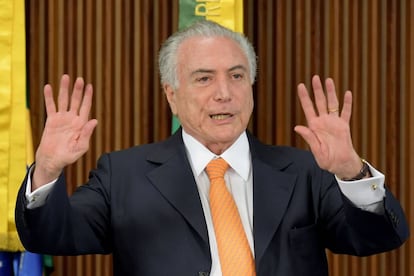Brazil’s new government announces ambitious privatization program
“We need to open up to the private sector because the state cannot do everything,” says president

In a bid to kickstart his country’s ailing economy and attract much-needed foreign investment, Brazil’s newly installed President Michel Temer on Tuesday announced sweeping measures to privatize and auction off licenses to operate oil and gas, electricity and infrastructure projects. Part of the plan, dubbed “Growth,” is a reworking of measures his predecessor, Dilma Rousseff, intended to launch last year. The first license auctions will not take place until 2017.
Up for auction are four airports, seven energy companies, three environmental services companies, as well as concessions to run three railway routes, three toll roads and two ports. Part of the Lotex lottery is to be sold off, while three oil fields and four mining zones will also be auctioned.
Temer’s government has taken its lead from Argentina, where measures have been welcomed by markets
The sell-off is matched by a series of austerity measures to narrow a record budget deficit and control debt that has cost Brazil its investment-grade rating and marred investor confidence in the once-booming economy. He has vowed to shift away from the interventionist economic policies of his predecessor, Dilma Rousseff.
Rousseff, in her second term as president, was ousted by the Senate in August for breaking budget rules. When Temer took over provisionally in May, he began preparing to implement major economic reforms.
“We need to open up to the private sector because the state cannot do everything,” Mr Temer told reporters on Tuesday.
The privatization of Salvador, Porto Alegre, Fortaleza and Florianópolis airports was due to take place in June of last year, but never went through. The original plan under Roussef was for Infraero, the state airport management company, to have retained a stake in the airports of between 15% and 49%, but under the new proposals buyers can purchase the company outright.
Rousseff’s privatization plans, launched in 2012 and 2015, hoped to attract private investment of between €32 billion and €53 billion, but failed. None of the six railways was auctioned, while a third of roads received no money. Temer’s team says that Rousseff’s Workers’ Party government insisted that any roads sold off would have to be widened; now only those with heavy traffic will need to be extended.
The sell-off is matched by a series of austerity measures to narrow a record budget deficit
Another innovation is that only projects that have proven environmental viability, and that have been approved by the country’s audit office, will be put up for auction. Part of the 5,000 federal projects currently paralyzed have been halted because of environmental issues or because the audit office has refused to approve them. All licenses up for bidding will be published in English and Portuguese.
Financing will mainly be through Brazil’s national development bank, BNDES, which will be able to provide 15-year finance with low long-term interest rates for up to 40% of airport and road concessions that must have at least a 20% equity stake by investors. The BNDES can subscribe up to 50% of bond issues in each project.
The BNDES’ priority will be to finance water treatment projects: it carried out a survey recently showing that 30% of Brazilians still have no access to treated water and that almost 100 million people live in homes that are not connected to the water-treatment network.
He adds that between now and next summer, when the program will be implemented, it will be worked on and amended. “This is a government that is open to criticism. It has launched a program in September that won’t be executed until June 2017. In other words, it is ready to receive feedback from all stakeholders, and if necessary, to make changes to the program.”
Temer’s government has taken its lead from neighboring Argentina, where the orthodox measures introduced by President Mauricio Macri have been welcomed by the markets and the multinationals, but that have so far failed to attract significant investment.
English version by Nick Lyne.
Tu suscripción se está usando en otro dispositivo
¿Quieres añadir otro usuario a tu suscripción?
Si continúas leyendo en este dispositivo, no se podrá leer en el otro.
FlechaTu suscripción se está usando en otro dispositivo y solo puedes acceder a EL PAÍS desde un dispositivo a la vez.
Si quieres compartir tu cuenta, cambia tu suscripción a la modalidad Premium, así podrás añadir otro usuario. Cada uno accederá con su propia cuenta de email, lo que os permitirá personalizar vuestra experiencia en EL PAÍS.
¿Tienes una suscripción de empresa? Accede aquí para contratar más cuentas.
En el caso de no saber quién está usando tu cuenta, te recomendamos cambiar tu contraseña aquí.
Si decides continuar compartiendo tu cuenta, este mensaje se mostrará en tu dispositivo y en el de la otra persona que está usando tu cuenta de forma indefinida, afectando a tu experiencia de lectura. Puedes consultar aquí los términos y condiciones de la suscripción digital.








































